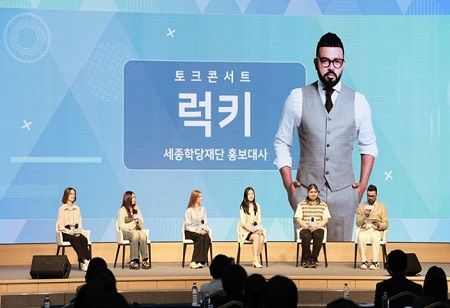Since its inception in Ulaanbaatar, Mongolia in 2007, the King Sejong Institute has emerged as a prominent authority in facilitating Korean language education worldwide for nearly twenty years. With 248 branches spanning across 85 nations, it catered to a student body exceeding 200,000 last year, offering a blend of in-person and online instructional formats.
The global fascination with the Korean language shows no signs of abating, propelled by the enduring appeal of the nation's cultural exports. In a significant development this year, Korean has been formally acknowledged as a secondary foreign language in schools in Paraguay and São Paulo, Brazil, joining the ranks of 23 other countries that have integrated it into their educational programs.
The King Sejong Institute Foundation (KSIF) convened a forum aimed at delving into its present hurdles and plotting a path forward. The gathering, held at the Science and Technology Convention Center in southern Seoul, commenced with a discussion session showcasing five speakers of international acclaim. Notably, each of these speakers had acquired proficiency in Korean through their respective local King Sejong Institute branches. “While double majoring in history and political science at university, I had the chance to take a course on the history of the Joseon Dynasty and the creation of ‘Hangeul,’” said Jade Nuzzolo from France.
“That’s what sparked my interest in Korean. I initially tried learning it on my own and then took a language course offered at my college, but it was a slow process. Eventually, I discovered the King Sejong Institute, and for three years, I enrolled in speaking classes there, which helped me naturally master the intonation and vocabulary,” she noted, adding that her dream is to work at the Embassy of France in Seoul as a diplomat.
Subsequent panel discussions featured experts who shared strategies for refining the operational scope of the King Sejong Institute to better address the rapidly growing and diversifying needs of Korean language learners in different regions, both offline and online. “Currently, more than half of those taking courses at the institute’s branches worldwide are in their 20s, and it is expected that interest in Korean will increase for younger age groups as they are exposed to the language at elementary and middle schools,” said Jeon Joo-young, head of the Institute of International Affairs at Kyungwoon University in North Gyeongsang Province.
To guarantee the presence of proficient educators capable of tailoring lessons for younger students, there was a focus on strengthening the function of "hub centers" within the network of King Sejong Institute branches in each country. Highlighting the necessity, they underscored the importance of refining and streamlining the operational frameworks of both the Online King Sejong Institute and the recently introduced metaverse platforms. Leveraging technologies like artificial intelligence was seen as pivotal in enhancing the effectiveness of these tools to meet the growing demand for Korean language education.

